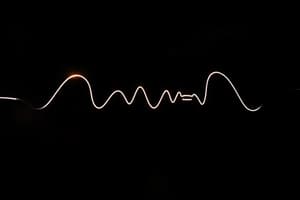Podcast
Questions and Answers
What are the basic terminologies in a DC circuit?
What are the basic terminologies in a DC circuit?
The basic terminologies in a DC circuit include Kirchhoff’s Current law, Kirchhoff’s Voltage law, Mesh Current Analysis, Nodal Voltage Analysis, Thevenin’s Theorem, Maximum power transfer Theorem, and Superposition Theorem.
What are the fundamental components of single-phase AC circuits?
What are the fundamental components of single-phase AC circuits?
The fundamental components of single-phase AC circuits include analysis of R-L, R-C, R-L-C series circuits, and the fundamentals of three-phase AC systems.
What is the difference between active and passive two terminal elements in electronic circuits?
What is the difference between active and passive two terminal elements in electronic circuits?
Active components supply energy to a circuit and have the ability to electrically control electron flow, while passive components do not supply energy and cannot control electron flow.
What is the purpose of an active component in an electronic circuit?
What is the purpose of an active component in an electronic circuit?
What are the elements used in both DC and AC circuits?
What are the elements used in both DC and AC circuits?
Flashcards are hidden until you start studying
Study Notes
Basic Terminologies in a DC Circuit
- Voltage (V) is the potential difference between two points in a circuit
- Current (I) is the flow of electrons from one point to another
- Resistance (R) is the opposition to the flow of electrons
- Power (P) is the rate of energy transfer
Fundamental Components of Single-Phase AC Circuits
- Resistors (R) oppose the flow of current
- Inductors (L) store energy in magnetic fields
- Capacitors (C) store energy in electric fields
Active and Passive Two-Terminal Elements
- Active elements (e.g. transistors, amplifiers) control the flow of current and can amplify or modify signals
- Passive elements (e.g. resistors, inductors, capacitors) cannot amplify or modify signals and only respond to the input
Purpose of Active Components
- Amplify weak signals
- Modify or condition signals
- Control the flow of current
Common Elements in Both DC and AC Circuits
- Resistors (R) used in both DC and AC circuits
- Capacitors (C) used in both DC and AC circuits for filtering and coupling
Studying That Suits You
Use AI to generate personalized quizzes and flashcards to suit your learning preferences.




